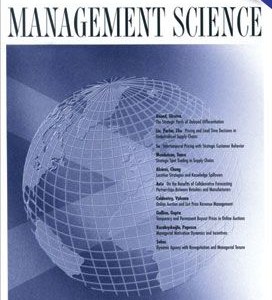
Bleichrodt, H., Cillo, A. and Diecidue, E. (2010). A quantitative measurement of regret theory Management Science, 56(1):161--175.
-
Affiliated author
-
Publication year2010
-
JournalManagement Science
This paper introduces a method to measure regret theory, a popular theory of decision under uncertainty. Regret theory allows for violations of transitivity, and it may seem paradoxical to quantitatively measure an intransitive theory. We adopt the trade-off method and show that it is robust to violations of transitivity. Our method makes no assumptions about the shape of the functions reflecting utility and regret. It can be performed at the individual level, taking account of preference heterogeneity. Our data support the main assumption of regret theory, that people are disproportionately averse to large regrets, even when event-splitting effects are controlled for. The findings are robust: similar results were obtained in two measurements using different stimuli. The data support the reliability of the trade-off method: its measurements could be replicated using different stimuli and were not susceptible to strategic responding.